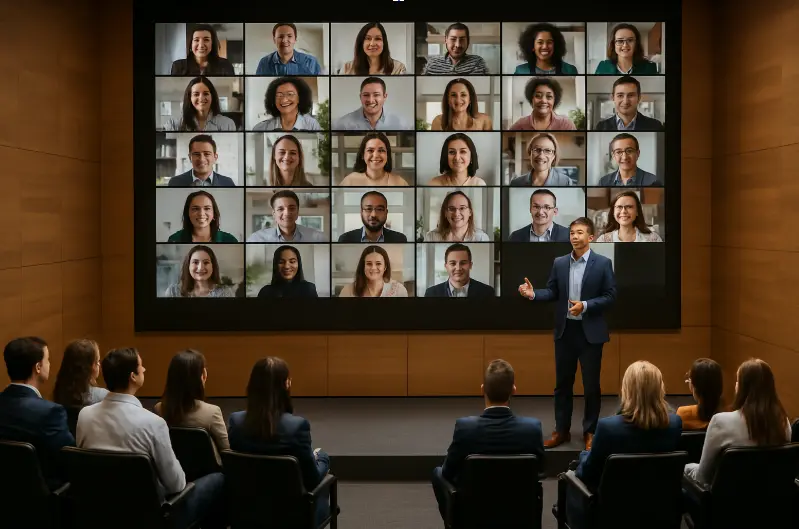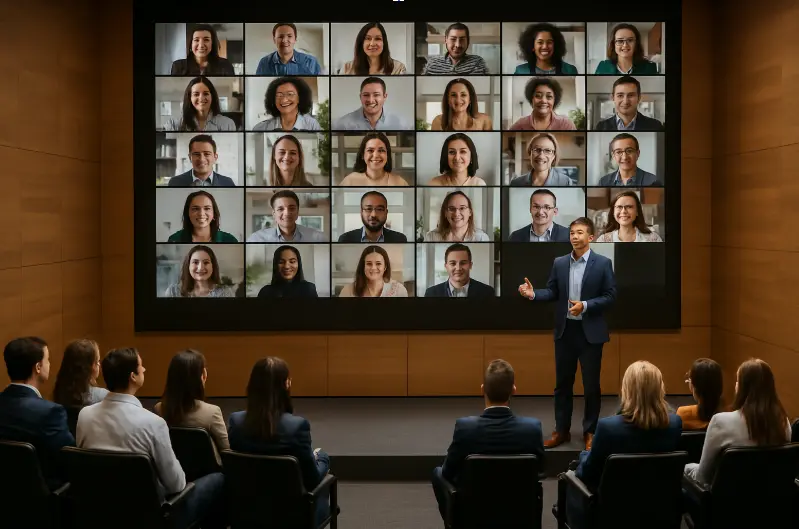2025-04-16 00:00:00


Hybrid events have become a core strategy in corporate communication, allowing companies to connect live and virtual audiences in real time. In 2025, hybrid event planning goes beyond just streaming content; it demands interactivity, flawless logistics, and a tailored experience for both in-person and online attendees.
Whether you're organizing a shareholder meeting in Madrid, a product launch in Barcelona, or an international keynote streamed globally, hybrid formats are redefining reach, inclusivity, and impact.
In this article, we explore best practices for hybrid event planning, checklist essentials, and how to adapt these strategies to the Spanish corporate landscape.
As workplace models become more flexible and global, hybrid events allow brands to:
Expand audience size without physical space limits
Reach global stakeholders in real time
Offer inclusive formats with on-demand access
Gather data from both live and virtual engagement
In destinations like Barcelona, Madrid, or Valencia, hybrid events also allow companies to integrate in-person networking with global visibility.
At CREA Group, we believe that successful hybrid events combine meticulous technical planning with deep local knowledge. As a DMC agency in Spain for corporate events, we craft seamless experiences that engage both in-person and remote audiences. From selecting tech-ready venues in cities like Barcelona or Madrid to designing content that resonates globally, our team ensures that every detail supports your event’s impact and ROI.
Consider what success looks like for both audiences onsite and online. Onsite participants may value networking and ambiance, while remote attendees might prioritize content accessibility and ease of interaction. Align both experiences to shared outcomes.
Select venues with proven connectivity, backup systems, and space for technical crews. Ensure AV partners are familiar with hybrid formats and test signal strength in every key location.
Deliver presentations in short, dynamic segments. Use strong visuals, real-time subtitles, and varied speakers to maintain attention across formats. Ensure camera placement allows remote viewers to feel immersed.
Incorporate live polling, chat moderation, breakout rooms, and interactive Q&A platforms. Gamify sessions to drive participation from both audiences and build a shared sense of community.
Conduct full technical rehearsals with all speakers and moderators. Simulate transitions between in-person and remote segments, test delays, and ensure audience interaction features function correctly.
Make session recordings available with added chaptering, subtitles, and downloadable takeaways. This extends the event's lifecycle and boosts ROI by allowing ongoing access and engagement.
Before the event:
Define KPIs and audience expectations
Confirm venue compatibility with tech needs
Hire AV professionals and a live streaming team
Create scripts and time blocks for moderators
Test all platforms and backup systems
During the event:
Moderate both audiences actively
Monitor sound, visuals, streaming quality
Capture interactions and Q&As for reporting
After the event:
Share a replay and downloadable materials
Send surveys to both audiences
Analyze engagement metrics and adjust for future editions
1. Hybrid award ceremonies
Held in prestigious venues in Barcelona, such events allow remote employees or partners to attend virtually, celebrating achievements together.
2. Shareholder meetings for IBEX-listed companies
These hybrid events often include real-time voting systems and the ability for virtual attendees to pose questions to board members.
3. Product launches and keynotes
From tech firms to automotive brands, companies use hybrid launches to unveil new products simultaneously across continents combining physical staging with interactive livestreams.
Hybrid event planning is especially impactful in Spain, where international access, venue quality, and creative production are top-level.
With over 18 years of experience, CREA Group events is a DMC agency in Spain for corporate events with expertise in complex formats like hybrid and multi-site events.
Our services include:
Venue sourcing in Barcelona, Madrid, and Seville
Coordination with audiovisual and streaming providers
Agenda design adapted for hybrid formats
Onsite and remote moderation logistics
We tailor each program to your strategic goals ensuring a seamless experience from both ends of the screen.
Discover our meeting planner services in Barcelona for integrated programs
As we look ahead, hybrid events in 2025 and beyond will continue to evolve with innovations that make experiences more inclusive, data-driven, and immersive. Trends to watch include:
AI-powered engagement tools: Chatbots, language translation, and real-time content suggestions for both live and remote attendees.
Green hybrid events: Combining digital formats with sustainability efforts (e.g., carbon tracking, zero-waste venues).
Immersive content design: Greater use of 3D graphics, holograms, and mixed reality to enhance virtual participation.
Advanced analytics: Sophisticated data dashboards to measure real-time engagement, content effectiveness, and behavioral insights.
Staying ahead of these innovations ensures your events remain relevant, inspiring, and strategically valuable
Hybrid events offer a powerful combination of flexibility, reach, and efficiency. Key benefits include:
Wider audience access: Reach participants regardless of location or travel restrictions.
Cost control: Reduce expenses linked to accommodation, transport, and venue capacity.
Sustainability: Minimize environmental impact by lowering physical footprint.
Data-driven decisions: Access real-time analytics to measure engagement across both audiences.
Greater inclusivity: Allow participants with accessibility needs or time constraints to join remotely.
Yes. Even workshops or internal trainings benefit from hybrid formats. With the right tools, small-scale hybrid events are cost-effective and impactful.
A destination management company like CREA Group events provides crucial support by:
Recommending venues with optimal technical infrastructure
Coordinating trusted audiovisual and live streaming vendors
Managing logistics on the ground for seamless integration of virtual tools
Aligning local execution with your brand’s goals and event vision

